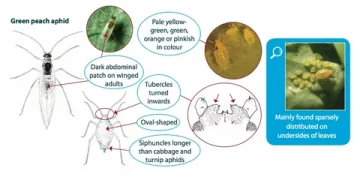In this article, we will discuss the Green Peach Aphid (Myzus persicae) and its impact on crop health. We will analyze the latest research data to provide insights into the damage caused by Green Peach Aphids, symptoms of their infestation, and the measures farmers can take to prevent and control the spread of these pests.
The Green Peach Aphid (GPA) is a major pest that attacks various crops worldwide. According to the latest research, GPA causes significant damage to crops by sucking the sap of the plant, which weakens the plant and reduces its growth. The symptoms of infestation include stunted growth, yellowing of leaves, and curling of leaves.
GPA infestation can result in various consequences, including yield losses, reduced crop quality, and the transmission of plant viruses. Farmers should take preventative measures to control the spread of GPA by using insecticides, removing infected plants, and implementing crop rotation practices.
Moreover, the use of natural predators and parasitoids, such as ladybugs and wasps, has been found to be an effective method of controlling GPA infestations. In addition, farmers can adopt integrated pest management (IPM) practices to prevent and control GPA infestations while minimizing the use of chemical pesticides.
In conclusion, the Green Peach Aphid is a significant threat to crops and can result in significant yield loss and reduced crop quality. Farmers should take preventative measures to control the spread of GPA and adopt effective control measures when necessary. By raising awareness about GPA and its consequences, we can ensure the sustainability of crop production in the long run.
Tags: #GreenPeachAphid #crophealth #pestcontrol #IPM #farmerawareness #preventativemeasures #croprotation #insecticides #sustainability #naturalpredators #parasitoids































